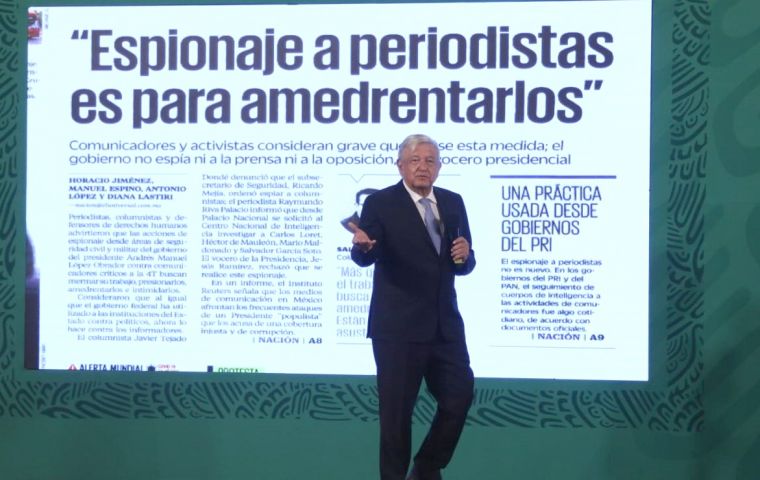MercoPress. South Atlantic News Agency
Mexican government accused of spying on non-acquiescent columnists
 A columnist wondered if AMLO wanted to become a copycat of Daniel Ortega or Nicolás Maduro
A columnist wondered if AMLO wanted to become a copycat of Daniel Ortega or Nicolás Maduro The Mexican government of President Andrés Manuel López Obrador (AMLO) has been accused this week of mounting an espionage scheme to intimidate journalists, it was reported by the newspaper El Universal.
Columnists and human rights activists have considered espionage against communicators to be regrettable, serious and worrying and said that just as the Fourth Transformation has used government institutions against politicians, now it does so against journalists. “It is the political use of state organs,” they said.
The Fourth Transformation is a series of education reforms pushed by the government of AMLO, who has denied the espionage allegations and offered a differing view: “It makes no sense to be thinking that we are going to spy on them, it is false. It does not make sense (to investigate) because it is totally false, it is that this newspaper is dedicated to defaming, it is the underworld of journalism,” the President said of El Nacional in his daily press conference.
In practice, according to news and press freedom organizations, it is exactly what previous governments and presidents have done against communicators.
El Universal columnist Javier Tejado Dondé denounced that the Undersecretary of Security and Citizen Protection, Ricardo Mejía Berdeja, ordered to spy on columnists, himself included, for having criticized the creation of the National Register of Mobile Telephone Users.
Raymundo Riva Palacio reported in El Financiero that the National Intelligence Center (CNI) was asked to investigate El Universal journalists such as Carlos Loret, Héctor de Mauleón, Mario Maldonado and Salvador García Soto, for writings questioning the Fourth Transformation.
Jan-Albert Hootsen, representative of the Committee to Protect Journalists in Mexico, warned that the agency has always been concerned about espionage practices in any government, including Mexico. “If there are indeed espionage operations directed at columnists and other journalists, it would be a very serious matter and something that must be investigated transparently and exhaustively. President López Obrador had promised that this would no longer occur in his government; he must deliver on that promise,” Hootsen said.
On this, García Soto said that in other governments espionage was a normal practice and Mexicans knew that the Cisen was made for that, for political espionage and it is not new, but it is surprisingly contrary to everything López Obrador stands for. Ultimately, these activities aim at “encouraging” columnists not to be too critical of Fourth Transformation.
Press freedom advocates have pointed out, however, that these practices prove “there is fear on the part of those who … do not want to be criticized.”
“What the federal government is doing is a crime, spying on journalists is an issue that goes with freedom of expression, democracy, because if there is no freedom of expression there is no democracy, I find it terrible, worrying,” columnist Mario Maldonado said.
MVS Noticias host Luis Cárdenas, a columnist for El Universal, insisted that “you cannot have a true democracy without exercising freedom of expression.”
He added that “a government which begins to harass journalists ends up later becoming a dictatorial government, and we have an example very close here, and it is the example of Nicaragua. I don't know if the ideal of President López Obrador is to become the simile of Daniel Ortega or Nicolás Maduro, and that everyone becomes a simple applauding seal of his Fourth Transformation,” he said.
When describing the problem as extremely serious, the director of the National Citizen Observatory (ONC), Francisco Rivas Rodríguez, asked the Attorney General's Office (FGR) to investigate whether the federal government was using public resources to spy on critical journalists. He described the Undersecretary of Public Security Mejía Berdeja as an official in fear who “operates on the verge of what is legal and illegal.”




Top Comments
Disclaimer & comment rulesCommenting for this story is now closed.
If you have a Facebook account, become a fan and comment on our Facebook Page!